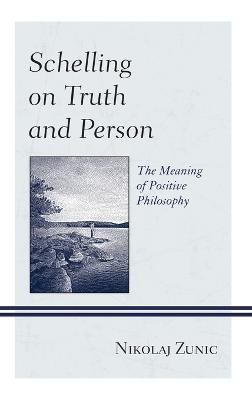
Schelling on Truth and Person
The Meaning of Positive Philosophy
Seiten
2022
Lexington Books/Fortress Academic (Verlag)
978-1-6669-1588-4 (ISBN)
Lexington Books/Fortress Academic (Verlag)
978-1-6669-1588-4 (ISBN)
This book reinterprets Friedrich Schelling's (1775–1854) positive philosophy as humanity's striving for truth. It presents truth in the context of the historical phenomena of mythology and religion and the anthropological categories of the soul, spirit, and personality.
Positive philosophy is the name that Friedrich Schelling (1775–1854) gave to a new type of philosophizing that stands in contrast to the so-called negative philosophy that is predominant in modern rationalism. But what exactly is positive philosophy? Schelling on Truth and Person: The Meaning of Positive Philosophy argues that its meaning lies in a distinctive view of the human person as a seeker of truth. Truth is presented as historically woven in the movement of life with the phenomena of mythology and religion that reveal the human being's falling away from and return to the truth. Nikolaj Zunic demonstrates that this novel understanding of truth accompanies the development and expression of positive philosophy itself. The anthropological dimension of truth relates to self-knowledge, the soul, spirit, and personality, and Schelling’s positive philosophy sheds light on the grand themes of the meaning of life, the ontological question (why is there something rather than nothing?), the enigma of knowledge and reason, and the affirmation of the existence of God. This book will appeal to students and scholars interested in Schelling's late philosophy as well as broader questions in philosophy concerning meaning, truth, human nature, and rationality.
Positive philosophy is the name that Friedrich Schelling (1775–1854) gave to a new type of philosophizing that stands in contrast to the so-called negative philosophy that is predominant in modern rationalism. But what exactly is positive philosophy? Schelling on Truth and Person: The Meaning of Positive Philosophy argues that its meaning lies in a distinctive view of the human person as a seeker of truth. Truth is presented as historically woven in the movement of life with the phenomena of mythology and religion that reveal the human being's falling away from and return to the truth. Nikolaj Zunic demonstrates that this novel understanding of truth accompanies the development and expression of positive philosophy itself. The anthropological dimension of truth relates to self-knowledge, the soul, spirit, and personality, and Schelling’s positive philosophy sheds light on the grand themes of the meaning of life, the ontological question (why is there something rather than nothing?), the enigma of knowledge and reason, and the affirmation of the existence of God. This book will appeal to students and scholars interested in Schelling's late philosophy as well as broader questions in philosophy concerning meaning, truth, human nature, and rationality.
Nikolaj Zunic is associate professor of philosophy at St. Jerome's University.
Contents
Abbreviations
Introduction
Part One: Truth in the Movement of Life
Chapter One: The Crisis of Philosophy
Chapter Two: The Presupposition of Positive Philosophy
Chapter Three: The Foundation of Truth
Chapter Four: Truth and Faith
Chapter Five: Truth in Philosophy: The Greek Nous and the Christian Logos
Part Two: The Revelation of the Person
Chapter Six: The Task of Self-Knowledge
Chapter Seven: Soul
Chapter Eight: Spirit
Chapter Nine: Personality
Epilogue: The Contradiction and Struggle of Life
Bibliography
About the Author
| Erscheinungsdatum | 05.08.2022 |
|---|---|
| Reihe/Serie | Contemporary Studies in Idealism |
| Sprache | englisch |
| Maße | 160 x 235 mm |
| Gewicht | 630 g |
| Themenwelt | Geisteswissenschaften ► Philosophie ► Geschichte der Philosophie |
| Geisteswissenschaften ► Philosophie ► Philosophie der Neuzeit | |
| Geisteswissenschaften ► Religion / Theologie | |
| ISBN-10 | 1-6669-1588-2 / 1666915882 |
| ISBN-13 | 978-1-6669-1588-4 / 9781666915884 |
| Zustand | Neuware |
| Haben Sie eine Frage zum Produkt? |
Mehr entdecken
aus dem Bereich
aus dem Bereich
die kolonialen Wurzeln der französischen Theorie
Buch | Hardcover (2024)
Matthes & Seitz Berlin (Verlag)
28,00 €
oder Das Leben Montaignes in einer Frage und zwanzig Antworten
Buch | Softcover (2023)
C.H.Beck (Verlag)
18,00 €


